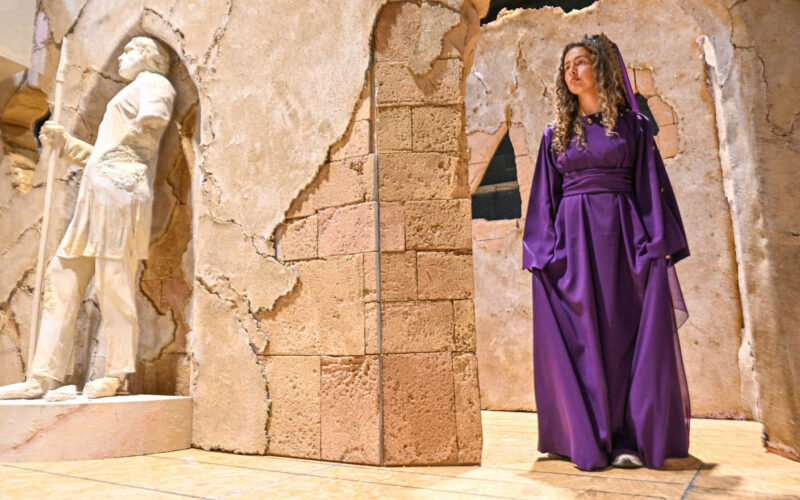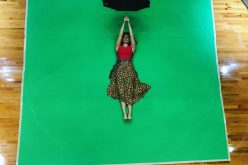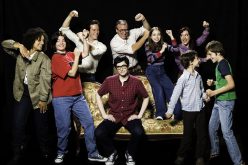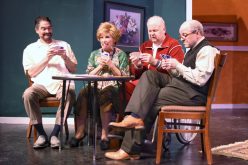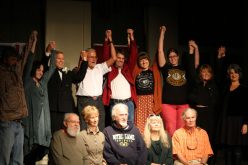BECCA MARTIN-BROWN
bmartin@nwaonline.com
“I’d like the audience to think about how crazy it is that a play from 415 B.C.E. dealing with war can still have this much relevance,” said Steven Marzolf, assistant professor of theater at the University of Arkansas in Fayetteville. “And what does that say about us as a species?”
Marzolf is directing the University Theatre production of “The Trojan Women,” Richard Lattimore’s popular 1950s translation of Greek playwright Euripides’ original work. Set just after the fall of Troy to the Greeks, “it’s a timeless tragedy that explores the devastating consequences of war, focusing on the experiences of the women of Troy. It provides a powerful commentary on the horrors of conflict and the resilience of the human spirit,” Marzolf says.
In the story, the women of Troy — even the dethroned queen, Hecuba — are forced into slavery and awarded to Greek victors — including Odysseus and Agamemnon — as spoils of war.
“What these characters endure is some of the most severe circumstances I have ever dealt with in a play,” said graduate acting student Bella Crawford, who portrays Hecuba. “With any role comes challenges … What occurs in the play itself … is incredibly emotionally heightened and horrible. However, with this struggle comes immense reward as I am consistently challenged and inspired by the depth of love, hope, and fight Hecuba has.”
Marzolf calls “The Trojan Women” “sadly, incredibly relevant.”
“I chose this piece to direct because last year, I saw a black and white picture in an old Time magazine from the Vietnam war where a mother was kneeling over the body of her dying child screaming ‘Why!,” he explains. “It’s an image one can see over and over and over again when looking at pictures or multimedia dealing with war.
“As intense as this subject matter is, the play is really beautiful because these women are so incredibly resilient; they lean on each other,” he mused. “As far as actors and acting this, none of us knew what it’s like to go through this. So we started by finding very contemporary archetypes and wartime parallels for the actors to relate to.”
“‘The Trojan Women’ reflects an aspect of humanity and womanhood that is ever present in our world,” added Crawford. “It shows you yourself in a way that is unexpected and demanding and beautiful.”
Visually, Marzolf and his colleagues have paid “homage to Ancient Greece.”
“The costumes of the women will have a slight feel of what they would have worn in Ancient Greece but could also pass today,” he said. “The men will be in more contemporary army fatigues. The set too has a slight feel to ancient Greece but could also pass for architecture of today [with] pillars, stone, etc.”
The actors, Marzolf said, have been challenged to understand the brutality of war, and “the play can and does take a toll. It’s very intense. The given circumstances for the actors must be very deep and personal in order for the audience to care.”
For that audience, both Marzolf and Crawford hope there is connection.
“It is about the experience of women and how this fight has been etched onto our bones since the dawn of time,” Crawford said. “I hope audiences will see that; I hope they will gather the sense of timelessness that this play echoes and fear it.”
“I say this all the time, but theater’s job is to lessen the distance between people’s hearts,” Marzolf explained. “So my unending hope is that when we see plays like this, we are touched and moved by them — feel empathy for the characters and what they are going through — and it causes us to be changed and transformed.
“It is through that personal transformation that we can begin to change and transform the world around us, which badly needs it right now.”
__
FAQ
‘The Trojan Women’
WHEN — 7:30 p.m. Oct. 18, 23-26; 2 p.m. Oct. 20, 26-27
WHERE — University Theatre on the UA campus in Fayetteville
COST — $20
INFO — theatre.uark.edu

